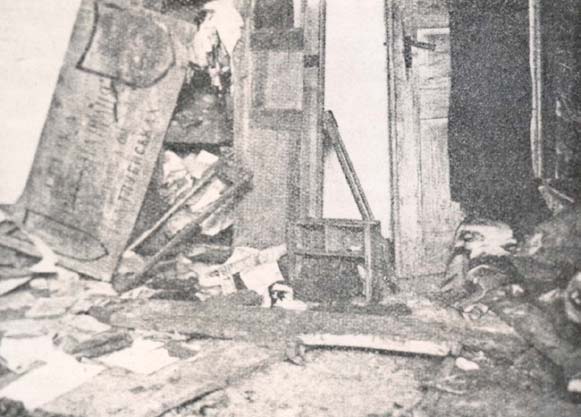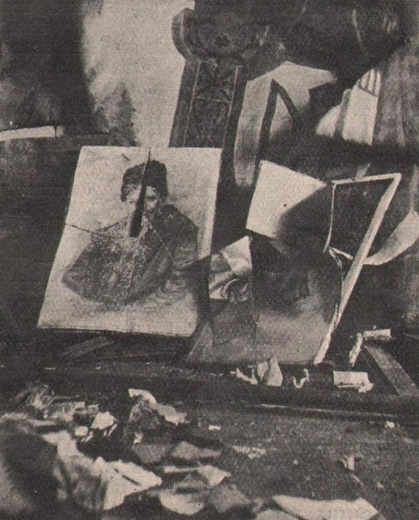Pacification
Pacification (Polish: Pacyfikacja; Ukrainian: Пацифікація). A campaign of repressions conducted by the Polish authorities against the Ukrainian population of Galicia in the summer and autumn of 1930. They were part of an operation intended to break up and intimidate opposition to the Sanacja regime on the eve of the parliamentary elections planned for November 1930. The ostensible rationale for the Pacification was the sabotage being carried out by the Ukrainian Military Organization (UVO), which began in July and reached a peak in September and October 1930. The scope of the operations and the manner in which they were carried out, however, made it clear that the Polish government was responding to more than just the UVO threat. In effect the Pacification was comparable to a pogrom against Ukrainians initiated, sanctioned, and executed by the Polish state authorities.
On 1 September Prime Minister Józef Piłsudski ordered the minister of the interior to send the police and army into the region affected by the actions. The security forces were supervised by Bronisław Pieracki (deputy minister), H. Suchenek-Suchecki (head of the nationalities department), and the voivode of Lviv, B. Nakonieczników-Klukowski. In the first week of September intensified control was introduced in Galicia, together with the checking of documents and searches and arrests among people suspected of Ukrainian Military Organization membership. About 20 leaders of the organization were detained at that time, including Ya. Nestor, Bohdan Kravtsiv, and Zynovii Knysh. On the night of 9 September the authorities imprisoned up to 20 leading members of the parliamentary opposition in an army fort in Brest, together with 5 Ukrainian deputies: Volodymyr Tselevych, Dmytro Paliiv, Ivan Lishchynsky, Osyp Kohut, and Oleksander Vyslotsky. On 20 September the regional commander of the UVO, Yuliian Holovinsky, was arrested outside the Ukrainian National Democratic Alliance (UNDO) offices in Lviv; he was shot on 30 September by the police, purportedly while attempting to escape.
On 21 September the Pacification proper was inaugurated. It lasted until 16 October and encompassed 28 counties of Galicia, where it focused on those villages regarded as sympathetic to the UVO. Security forces commonly surrounded a given village and carried out a detailed search of all its buildings. In the course of many of their actions they devastated the interiors as well as entire houses, removed Ukrainian signs, and indiscriminately destroyed Ukrainian cultural objects (including books, stage wardrobes, folk dress, native needlework, and the like). The army engaged in what it referred to as heavy quartering (compulsory requisitions for food and grain). The population was often forced to sign declarations of loyalty to Poland and to renounce their affiliation to the Ukrainian nation; prominent local leaders were publicly ridiculed. Whippings were widely administered, and seven people died as a result of beatings (Polish sources claimed two victims).
Polish Ministry of the Interior files note that 144 rifles, 156 pistols, 40 kg of dynamite, and 39 kg of gunpowder, as well as other explosives and UVO propaganda literature, were found during the searches. By the end of 1930, 970 persons had been arrested, of whom 538 were released and 432 turned over to the courts. The courts set free 330 persons and proved UVO membership in the case of 42 persons. The detainees included peasants (550), secondary school pupils (135), and students (124). Official Polish reports at that time claimed a larger amount of arms and a greater number of arrests.
The Pacification campaign also affected mainstream Ukrainian political groups and institutions. After the discovery of contacts between the Ukrainian Military Organization and the Ukrainian National Democratic Alliance leadership the offices of the UNDO in Lviv were searched, and on 30 September several UNDO members were arrested—Dmytro Levytsky, Liubomyr Makarushka, and Vasyl Mudry. On 24 September the authorities closed the Ukrainian secondary schools in Ternopil, Drohobych, and Rohatyn and delegalized the organization Plast Ukrainian Youth Association. In village raids Ukrainian reading rooms and co-operative stores were among the buildings specifically targeted for searches (and damage).
The Pacification met with public condemnation in many countries (including Great Britain, France, and Germany). A protest was voiced by Metropolitan Andrei Sheptytsky, who came to Warsaw on 3 October in an unsuccessful attempt to meet with Józef Piłsudski; his pastoral letter on the matter was subsequently confiscated. Ukrainian émigré groups published accounts of the Polish action in several languages. In December 1930 the Ukrainian Parliamentary Representation in the Sejm moved for examination of the events surrounding the Pacification and the punishment of those guilty of the acts of terror. It was rejected by the Polish majority. Ukrainian representations to the League of Nations on the issue of the Pacification began in November 1930. Although sympathetic hearing was given to various memorandums submitted and circulated among committees and state missions, the Council of the League issued a statement as late as January 1932 in which it stated that the Polish actions could be justified because of Ukrainian sabotage activities.
BIBLIOGRAPHY
Na vichnu han’bu Pol’shchi (Prague 1931)
Revyuk, E. (ed). Polish Atrocities in Ukraine (New York 1931)
Knysh, Z. Dryzhyt’ pidzemnyi huk: Spohady z 1930 i 1931 rokiv u Halychyni (Winnipeg 1953)
Chojnowski, A. Koncepcje polityki narodowościowej rządów polskich w latach 1921–1939 (Wrocław 1979)
Klymyshyn, M. V pokhodi do voli: Spomyny, vol 1 (Detroit 1987)
Vysots'kyi, R. Patsyfikatsiia Halychyny 1930 roku: Dokumenty (Lviv 2019)
Andrzej Chojnowski
[This article originally appeared in the Encyclopedia of Ukraine, vol. 3 (1993).]


